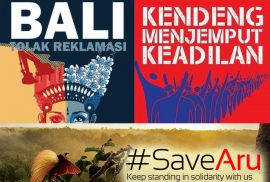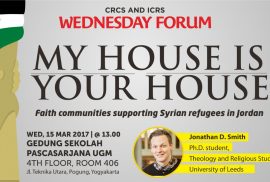Jonathan D Smith | CRCS | Essay

Indonesia is home to many environmental movements, either led by established environmental activists or by groups of indigenous people. The reclamation project in Benoa Bay, cement mining in Kendeng area, Central Java, and the Save Aru movement are just a few recent examples. Does religion play a role in these movements? Are these local movements related to the growing global environmental movement?
The local and global is a crucial element of environmental movements, because environmental problems defy boundaries. Our rapidly-changing climate poses an urgent challenge that is both global and local. As national governments slowly acknowledge their role in reducing carbon emissions (with some exceptions), local communities in Indonesia are living with the problems of rising temperatures and sea levels, increases in natural disasters, and increasing pollution of our air and water.
Local-global connections in religious environmental movements
In 2016 at the climate summit in Morocco, governments met to affirm their adoption of the 2015 Paris Climate Agreement. Signed by 111 countries (as of November 2016), the agreement commits to reducing carbon emissions and recognizes the human impact on climate change. At the same climate summit in Marrakech, hundreds of religious leaders and environmental activists launched the Interfaith Climate Statement.
The Interfaith Climate Statement included these words:
jonathan d smith

Abstract
Since 2011, 5 million Syrians have fled civil war in their country. Most of these refugees live in local communities in neighboring countries. Local faith communities and global humanitarian actors regularly work together to provide assistance for Syrian refugees. This talk presents research about Arab and Western Christians providing support for Syrian refugees living in Jordan, based on fieldwork conducted in 2015-16. The talk addresses three questions raised in literature about faith-based organizations working in humanitarian and development projects: 1) Do religious groups approach aid differently from non-religious (secular) organizations?; 2) What is the role of local faith communities in providing humanitarian aid?; 3) How do religious groups providing aid manage religious difference and deal with challenges of proselytization?
Speaker
Jonathan D. Smith is a PhD student in Theology and Religious Studies at the University of Leeds in the United Kingdom. His research focuses on faith-based organizations in the Middle East and their effect on Muslim-Christian relations. He is currently conducting research at CRCS about religion and environmental social movements.
Look at the event’s poster here.


